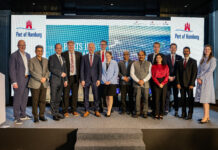
Avocados, fish, blueberries – today, consumers all over the world expect to be able to buy the freshest products at their local supermarket throughout the year. This, of course, would be impossible without reefer containers transporting temperature sensitive cargo across the globe. Refrigerated containers keep temperature-sensitive cargo at their required temperature throughout the transportation, making sure that consumers worldwide can enjoy quality products anytime and anywhere.
No longer than ten years ago, you couldn’t find seasonal products like blueberries outside the summer months in most cities in the developed world. But today, around 8.8 million TEU of refrigerated cargo is exported worldwide each year, with a big portion of it being shipped from Latin America. Meat, fruits, and fish are amongst the most exported commodities from this region, and they end up on the store shelves especially in Europe, North America and Asia.
Hot demand for cold shipping
A large majority of the global reefer transportation takes place between December and April, during the harvest season of many of the fruits and vegetables from the Southern Hemisphere. These transports ensure that consumers located in northern parts of the globe have access to fresh produce even during the winter months. The demand for global reefer shipping is growing steadily and upcoming markets – such as Colombia and Peru – are booming. One great example is the increase in global cherry exports, which have grown by almost 70 percent in just the last three years.
However, agricultural goods aren’t alone responsible for the steady growth in the reefer market. For example, the pharmaceutical industry has experienced rapid growth over the past years and is opting to have a larger and larger volume of its products transported by ship rather than by the traditional method of air freight. Hapag-Lloyd has also chosen growing and profitable reefer segments, such as pharmaceuticals and blood plasma, as strategic focus markets for the years ahead.

Reefer investments on the rise
To keep up with the growing industry, Hapag-Lloyd has been continuously investing in new reefer equipment in recent years. In August 2018, the company announced yet another investment in its reefer fleet: an order of 11,100 new state-of-the-art reefer containers. Since 2015 alone, and including the most recent order, the company has purchased a total of 30,550 new reefers to ensure that it can offer modern equipment and sufficient seasonal availability to its customers, particularly during peak times.
“There are several reasons why continuous investments are important,” says Clemens Holz, Director Reefer Products. “We need to make sure we can meet both our growth expectations and growing market demands as well as keep our reefer fleet reliable and efficient. Furthermore we want to take advantage of opportunities in the fast-growing reefer technology segments, such as Controlled Atmosphere.”
The 11,100 new containers will be gradually integrated to Hapag-Lloyd’s existing reefer fleet just in time for the upcoming peak season. A young and modern reefer fleet is critical when it comes to reefer transportation, as high-end technologies play a key role in ensuring that sensitive commodities arrive at their destination in optimal condition. This is where Controlled Atmosphere technologies, such as ExtraFresh and ExtraFresh Plus, come into play. They slow down the ripening process and prevent decay-causing organisms from growing, which results in longer shelf lives and top quality products.
This week, the biggest players in the reefer business – including Hapag-Lloyd – will gather in Hong Kong at Asia Fruit Logistica, the largest reefer trade fair in the region. Around 13,000 decision-makers from more than 70 countries are expected to attend the fair




